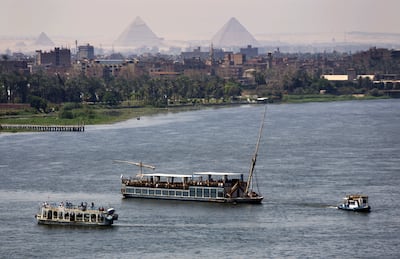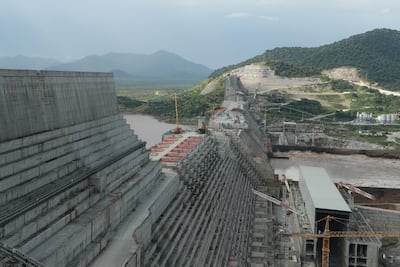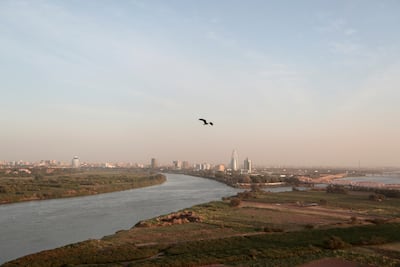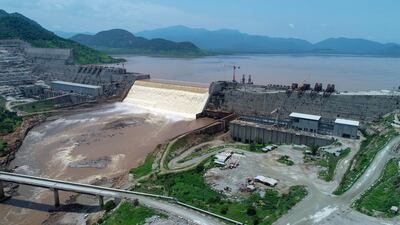Egypt and Sudan welcomed a UN Security Council statement on their dispute with Ethiopia over a hydroelectric Nile dam being built by Addis Ababa, despite the international body’s reluctance to become directly involved in the long-running row.
The two downstream nations had wanted the Security Council to directly intervene in the dispute with upstream Ethiopia, but the international body instead urged the three nations to return to negotiations led by the African Union.
The council said late on Wednesday that the three should “finalise expeditiously” a deal on filling and operating the multibillion-dollar Grand Ethiopian Renaissance Dam.
When completed, the dam on the Blue Nile – the source of more than 80 per cent of the river’s water – will be Africa’s largest and will generate 6,000 megawatts of power.
Ethiopia says the dam is key to its development and will lift millions of its people from poverty. It has repeatedly assured Egypt and Sudan that they have nothing to fear from the dam, which is less than 20 kilometres from the Sudan border.

But Egypt is concerned that the dam could significantly reduce its share of Nile water, on which it depends for almost its entire fresh water needs, wiping out hundreds of thousands of jobs and upending its delicate food balance.
Egyptian President Abdel Fattah El Sisi has said the dam posed an existential threat to his country. In March, he warned of serious instability in the region if his country’s share of the Nile water was reduced.
Sudan, Egypt’s neighbour to the south, insists Ethiopia must co-ordinate the running and filling of the dam quickly to ensure work at its own power-generating dams is not disrupted and destructive floods can be averted. It says the life of half its 40 million people would be at risk if no deal is reached.
Late on Wednesday, the Egyptian Foreign Ministry said the UN Security Council statement amounted to “an important push to current efforts to ensure the success of the African negotiating track".
“This forces Ethiopia to be seriously involved with a genuine political will in negotiations leading to a legally binding agreement on the rules of filling and operating the dam.”

In a statement on Thursday, Sudan also welcomed the UN statement, saying Khartoum hoped it would soon lead to the resumption of negotiations.
"Sudan is ready to be constructively involved in any process leading to the resumption of the negotiations," the Sudanese Foreign Ministry said.
The UN Security Council statement and the Egyptian response came amid of flurry of diplomatic activity that suggests the resumption of talks, which collapsed in April, could be imminent.
Christophe Lutundula, foreign minister of the Democratic Republic of Congo, the current African Union chair, was in Khartoum, Sudan’s capital, on Wednesday and was expected in Cairo on Thursday for talks.
Egypt’s intelligence chief, Abbas Kamel, flew to Khartoum on Wednesday on a previously unannounced visit. Mr El Sisi on Tuesday spoke to DRC President Felix Tshisekedi by telephone.
Egypt and Sudan, bound by close political, economic and military ties, want Ethiopia to enter a legally binding agreement on the filling and operating of the dam as well as mechanisms to deal with future drought and disputes.
They also wanted outside parties such as the US, European Union and the UN to be involved in the negotiations. They said a year of negotiations under the leadership of the African Union has yielded no progress.
Ethiopia says guidelines, not a legally binding deal, on the filling and operating of the dam should suffice. It rejects the involvement of outside parties in the talks, arguing that the dispute is an African issue that should be settled by Africans.
Egypt and Sudan initially wanted the UN Security Council to issue a resolution that would declare the dispute a threat to security and stability in the region.

A draft resolution tabled by non-permanent member Tunisia included an outline of the grave dangers the dam posed to Egypt and Sudan.
After the council released its statement, Ethiopia’s UN ambassador Taye Atske Selassie said the row was beyond the council’s remit.
“The council deals only with threats to international peace and security,” Mr Selassie said. “The tripartite negotiation is the only way to reach a conclusion on the matter.”
Egypt’s deputy UN ambassador Osama Abdelkhalek said Cairo’s concerns had been “duly considered” by the council.
“Egypt was always supportive of the right of Ethiopia to generate electricity,” Mr Abdelkhalek said. “But equally of the same right of the two downstream countries, Egypt and Sudan, to guarantee their water security to have safeguards when it comes to their existential needs of water.”
Additional reporting by James Reinl in New York.


